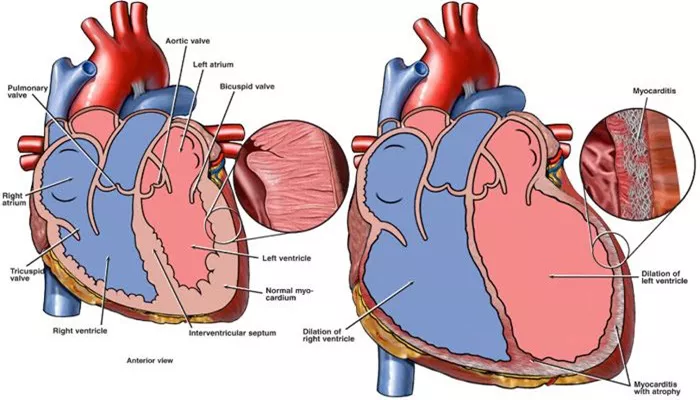Sclerotic myocarditis is a type of inflammatory heart disease characterized by the hardening and scarring of the heart muscle tissue due to chronic inflammation. This condition can lead to significant impairment of the heart’s function, potentially resulting in heart failure and other serious cardiovascular complications. In this article, we will explore the nature of sclerotic myocarditis, its causes, symptoms, diagnosis, treatment options, and the populations most at risk.
What Is Sclerotic Myocarditis?
Myocarditis refers to inflammation of the heart muscle, or myocardium. When this inflammation leads to the formation of scar tissue (sclerosis), the condition is termed sclerotic myocarditis. This scarring disrupts the normal functioning of the heart muscle, reducing its ability to contract and pump blood efficiently.
Causes of Sclerotic Myocarditis
The primary causes of sclerotic myocarditis can be broadly categorized into infectious and non-infectious origins:
Infectious Causes:
Viral Infections: Common viruses such as the Coxsackievirus, adenovirus, and parvovirus B19 are often implicated in causing myocarditis, which can progress to sclerosis if chronic.
Bacterial Infections: Bacteria like Staphylococcus, Streptococcus, and Lyme disease bacteria (Borrelia burgdorferi) can also lead to myocarditis.
Fungal and Parasitic Infections: In rare cases, fungal infections (e.g., Aspergillus) and parasites (e.g., Trypanosoma cruzi causing Chagas disease) can cause myocarditis.
see also: Why Does Myocarditis Affect Athletes?
Non-Infectious Causes:
Autoimmune Diseases: Conditions such as lupus, rheumatoid arthritis, and sarcoidosis can result in chronic inflammation of the heart muscle.
Toxins: Exposure to certain toxins, including alcohol, drugs (e.g., cocaine), and chemotherapeutic agents, can cause myocarditis.
Hypersensitivity Reactions: Allergic reactions to medications or other substances can lead to myocarditis.
Symptoms of Sclerotic Myocarditis
The symptoms of sclerotic myocarditis can vary widely, ranging from mild to severe. They often include:
Chest Pain: Often similar to the pain experienced during a heart attack.
Fatigue: Persistent tiredness and weakness.
Shortness of Breath: Difficulty breathing, especially during physical activity or when lying down.
Palpitations: Irregular or rapid heartbeats.
Swelling: Edema, particularly in the legs, ankles, and feet.
Dizziness or Fainting: Due to inadequate blood flow to the brain.
Diagnosis of Sclerotic Myocarditis
Diagnosing sclerotic myocarditis involves a combination of clinical evaluation, imaging studies, and laboratory tests:
Clinical Evaluation:
Medical History and Physical Examination: A thorough history of symptoms, possible exposure to infections, and a physical exam to detect signs of heart failure or other abnormalities.
Imaging Studies:
Echocardiography: Uses ultrasound to visualize heart structure and function.
Magnetic Resonance Imaging (MRI): Provides detailed images of the heart muscle and can detect inflammation and scarring.
Laboratory Tests:
Blood Tests: Measure markers of inflammation (e.g., C-reactive protein) and cardiac enzymes indicating heart muscle damage.
Viral Studies: Identify possible viral infections.
Endomyocardial Biopsy: Involves taking a small sample of heart tissue for microscopic examination to confirm inflammation and scarring.
Treatment of Sclerotic Myocarditis
The treatment of sclerotic myocarditis focuses on managing symptoms, reducing inflammation, and preventing further heart damage. It typically includes:
Medications:
Anti-inflammatory Drugs: Corticosteroids or other immunosuppressive agents to reduce inflammation.
Heart Failure Medications: ACE inhibitors, beta-blockers, and diuretics to manage heart failure symptoms.
Antiviral or Antibacterial Agents: If an infection is identified as the cause.
Lifestyle Modifications:
Diet and Exercise: A heart-healthy diet and regular physical activity can help manage symptoms and improve overall heart health.
Avoiding Alcohol and Drugs: Reducing or eliminating the intake of substances that can worsen heart conditions.
Advanced Therapies:
Implantable Devices: Pacemakers or defibrillators to manage arrhythmias and prevent sudden cardiac death.
Heart Transplantation: In severe cases where other treatments fail, a heart transplant may be necessary.
Populations at Risk
Certain populations are more susceptible to developing sclerotic myocarditis. These include:
Individuals with Autoimmune Diseases: People with conditions like lupus or rheumatoid arthritis have a higher risk due to chronic inflammation.
Those with a History of Viral Infections: Previous infections with myocarditis-causing viruses increase the likelihood of developing sclerotic myocarditis.
Patients with Chronic Alcohol or Drug Use: Long-term exposure to toxic substances can lead to heart muscle damage and inflammation.
Individuals with a Family History of Heart Disease: Genetic predisposition may play a role in susceptibility.
Elderly Population: Age-related changes in the immune system and heart structure make older adults more prone to this condition.
Preventing Sclerotic Myocarditis
Prevention strategies for sclerotic myocarditis focus on reducing risk factors and maintaining heart health:
Vaccinations: Staying up-to-date with vaccines, especially against influenza and other viral infections.
Healthy Lifestyle: Regular exercise, a balanced diet, and avoiding smoking and excessive alcohol consumption.
Managing Autoimmune Diseases: Effective control of autoimmune conditions to minimize inflammation.
Prompt Treatment of Infections: Early intervention and treatment of infections to prevent progression to myocarditis.
Regular Medical Check-ups: Routine health screenings to detect and manage risk factors for heart disease.
Conclusion
Sclerotic myocarditis is a serious condition resulting from chronic inflammation and scarring of the heart muscle. Early recognition and management are crucial to preventing severe complications such as heart failure. Understanding the causes, symptoms, and treatment options, along with awareness of at-risk populations, can help in the effective management and prevention of this condition. Maintaining a heart-healthy lifestyle and seeking timely medical care are key steps in protecting heart health and preventing sclerotic myocarditis.

